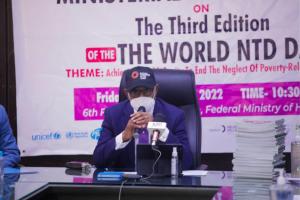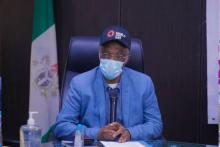World Neglected Tropical Disease Day: Achieving health equity to end the neglect of poverty-related diseases
Abuja, 31 January, 2022 - “The first time I noticed a sore on my left hand, I did not take it seriously because I thought I had injured myself unknowingly. However, when the wound failed to heal, and sores came out, on the other hand, I decided to go to the hospital”, says Mr. Bako Ibrahim, a 25 years old taxi driver resident in Gima village, Konduga Local Government Area (LGA), Borno State.
Mr. Bako was diagnosed with Cutaneous Leishmaniasis, a Neglected Tropical Disease (NTDs).
“I do not know how I contracted the disease. I have not been able to work in the last eight weeks because of the sore on my hands”, he said.
Mr Bako is one of the 1.5 billion people infected by NTDs, such as Leishmaniasis, Buruli Ulcer, Chagas Disease, Leprosy, Cysticercosis, Dengue Fever, Dracunculiasis (Guinea Worm Disease) Echinococcosis, Fascioliasis, found in several countries in Africa, Asia and Latin America.
In commemoration of this year's World NTD Day, the Government of Nigeria reaffirmed its commitment to eliminating all forms of NTDs, while urging stakeholders to focus on mobilizing local resources to strengthen interventions in tackling the high burden of the diseases.
The Mminister of State for Health, Dr Olorunnimbe Mamora, addressing to stakeholders and journalists at the ministerial press briefing in Abuja on the 28th of January 2022, said Africa bears about half of the global burdens of NTDs, with Nigeria contributing substantially with more than 120 million people living at risk of contracting at least one NTDs.
Dr Mamora said that NTDs are diseases that mostly affect people who live mostly in impoverished communities and prevalent in areas that have poor sanitation, poor safe water supply and substandard housing conditions.
“They are common in Tropical areas where people do not have access to clean water or safe ways to dispose of human waste. Consequently, Water, Sanitation and Hygiene (WASH) is an essential strategy of NTDs control and elimination globally which must be promoted in Nigeria.
“Nigeria will work with partners to achieve the WHO road map for eradicating NTDs as we remain committed to tackling the menace and determined to achieve the Kigali Declaration on NTDs”, he said.
Highlighting some of the achievements so far, he said that Nigeria has been able to successfully eliminate Dracunculiasis (Guinea Worm Disease) in the country and also eliminated the transmission of Onchocerciasis in Plateau and Nasarawa States and, very soon, some other states will be free of the disease.
In his goodwill message, the WHO Country Representative (WR), Dr Walter Kazadi Mulombo, said this year's theme is "Achieving health equity to end the neglect of poverty-related diseases” emphasizes the need for increased collaboration by all stakeholders to eradicate the diseases.
Dr. Mulombo emphasized that the country is important in the global NTD eradication road map and commended the government on the significant progress made in treatment and control of NTDs.
“NTDs are the manifestation of social injustice and health inequalities, but curable. I pledge WHO’s commitment to continue partnering with the Federal Ministry of Health and other departments, partners and stakeholders working on NTDs through the provision of technical support, and innovations towards the attainment of the set targets. WHO is committed to facilitating the donation of all essential medicines for NTDs as it has always done each year”, he said.
The theme of the campaign for 2022 World Neglected Tropical Diseases Day (WNTDD) is: “Achieving health equity to end the neglect of poverty-related diseases”. The day help focus on millions of people who have limited or no access to prevention, treatment and care service.
Technical Contacts:
Dr Anne Jean Baptiste; Email: jeana [at] who.int (jeana[at]who[dot]int)

